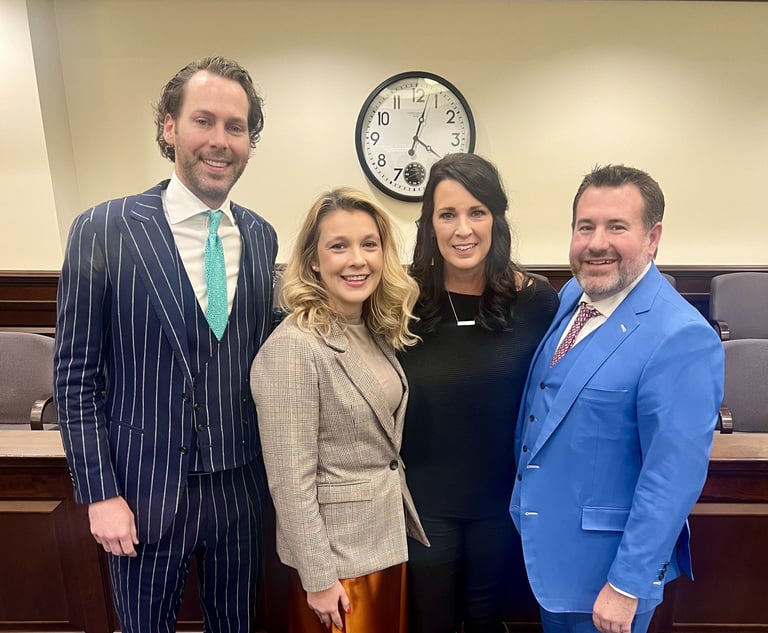Court Rules Insured Did Not Waive 'Inter-Policy' Stacking of UIM Benefits
A federal district court in Pennsylvania has ruled that a waiver signed by an insured did not waive the right to aggregate or “stack” the limits of coverage for underinsured benefits between two separate policies of insurance.
July 03, 2019 at 10:00 AM
4 minute read
The original version of this story was published on Law.com
 Photo: Oleg Bezrukov/Shutterstock.com
Photo: Oleg Bezrukov/Shutterstock.com
This story is reprinted with permission from the Insurance Coverage Law Center, the industry's only comprehensive digital resource designed for insurance coverage law professionals. Visit the website to subscribe.
A federal district court in Pennsylvania has ruled that a waiver signed by an insured did not waive the right to aggregate or “stack” the limits of coverage for underinsured (UIM) benefits between two separate policies of insurance, commonly referred to as “inter-policy” stacking.
The Case
After Corey Donovan was involved in an accident while riding his motorcycle, the insurer for the motorist who allegedly struck Donovan tendered the full liability limit of $25,000 available under the motorist's policy.
Donovan then filed a claim for UIM benefits under the motorcycle policy he held with State Farm Mutual Automobile Insurance Co. The policy provided UIM coverage up to $50,000 per person, and State Farm tendered the full limit available under the policy.
Donovan's mother, Linda Donovan, with whom Corey Donovan resided, maintained an automobile insurance policy with State Farm that extended UIM coverage to “resident relatives.” After his motorcycle accident, Donovan filed a claim for UIM benefits under his mother's policy, which provided for UIM benefits of up to $100,000 per individual.
State Farm denied this claim, stating that Linda Donovan's policy did not allow for additional coverage of Corey Donovan because she previously had signed a waiver declining stacked UIM benefits under her policy.
According to State Farm, the waiver eliminated both the right to stack limits of coverage as to the vehicles identified in the policy—intra-policy stacking—and the right to combine the policy's UIM benefits with any other State Farm policy—inter-policy stacking.
The Donovans contended that the waiver applied only to intra-policy stacking, and they filed an action seeking declaratory relief.
The parties moved for summary judgment.
The State Farm Policy
The waiver in Linda Donovan's policy provided:
“By signing this waiver, I am rejecting stacked limits of underinsured motorist coverage under the policy for myself and members of my household under which the limits of coverage available would be the sum of limits for each motor vehicle insured under the policy. Instead, the limits of coverage that I am purchasing shall be reduced to the limits stated in the policy. I knowingly and voluntarily reject stacked limits of coverage. I understand my premiums will be reduced if I reject this coverage.”
The District Court's Decision
The district court granted summary judgment in favor of the Donovans, holding that the waiver signed by Donovan did not waive inter-policy stacking.
In its decision, the district court explained that the waiver signed by Linda Donovan referred only to a “single policy form” and, therefore, did not “clearly address” inter-policy stacking.
State Farm could not rely on Donovan's waiver of intra-policy stacking because her policy covered multiple vehicles, the district court added. Moreover, it continued, the premium reduction Donovan acknowledged in waiving stacking correlated with a waiver of intra-policy stacking, and State Farm had not demonstrated any additional saving attributable to her purported waiver of inter-policy stacking.
The district court found that State Farm had “not provided any basis for the conclusion that Donovan's waiver applied to inter-policy as well as intra-policy stacking.”
It declared that even if there was a defect in the waiver provision in Pennsylvania's Motor Vehicle Financial Responsibility Law (MVFRL) that State Farm tracked in Donovan's policy, State Farm was “well aware of that defect and of its obligation to secure a knowing waiver of inter-policy stacking.” In the final analysis, the district court concluded, State Farm had to “bear responsibility” for the policy it issued.
The case is Donovan v. State Farm Mutual Automobile Insurance.
Attorneys involved include: for the Donovans, James C. Haggerty of Haggerty, Goldberg, Schleifer & Kupersmith in Philadelphia; for State Farm, John J. Mcgrath of Palmer & Barr in Philadelphia.
Steven A. Meyerowitz, a Harvard Law School graduate, is the founder and president of Meyerowitz Communications Inc., a law firm marketing communications consulting company. Meyerowitz is the director of the Insurance Coverage Law Center and editor-in-chief of journals on insurance law, banking law, bankruptcy law, energy law, government contracting law, and privacy and cybersecurity law, among other subjects. He can be contacted at [email protected].
This content has been archived. It is available through our partners, LexisNexis® and Bloomberg Law.
To view this content, please continue to their sites.
Not a Lexis Subscriber?
Subscribe Now
Not a Bloomberg Law Subscriber?
Subscribe Now
NOT FOR REPRINT
© 2025 ALM Global, LLC, All Rights Reserved. Request academic re-use from www.copyright.com. All other uses, submit a request to [email protected]. For more information visit Asset & Logo Licensing.
You Might Like
View All
Philadelphia Eagles 0-2 in Attempts to Recover Insurance on COVID-Related Losses
4 minute read
High Verdicts and Venue Rule Land Pa. Courts on Top of 'Judicial Hellhole' List
5 minute read

Judge Approves $667K Settlement Against Independence Blue Cross for Unpaid, Pre-Shift Computer Work
4 minute readTrending Stories
- 1'It's Not Going to Be Pretty': PayPal, Capital One Face Novel Class Actions Over 'Poaching' Commissions Owed Influencers
- 211th Circuit Rejects Trump's Emergency Request as DOJ Prepares to Release Special Counsel's Final Report
- 3Supreme Court Takes Up Challenge to ACA Task Force
- 4'Tragedy of Unspeakable Proportions:' Could Edison, DWP, Face Lawsuits Over LA Wildfires?
- 5Meta Pulls Plug on DEI Programs
Who Got The Work
Michael G. Bongiorno, Andrew Scott Dulberg and Elizabeth E. Driscoll from Wilmer Cutler Pickering Hale and Dorr have stepped in to represent Symbotic Inc., an A.I.-enabled technology platform that focuses on increasing supply chain efficiency, and other defendants in a pending shareholder derivative lawsuit. The case, filed Oct. 2 in Massachusetts District Court by the Brown Law Firm on behalf of Stephen Austen, accuses certain officers and directors of misleading investors in regard to Symbotic's potential for margin growth by failing to disclose that the company was not equipped to timely deploy its systems or manage expenses through project delays. The case, assigned to U.S. District Judge Nathaniel M. Gorton, is 1:24-cv-12522, Austen v. Cohen et al.
Who Got The Work
Edmund Polubinski and Marie Killmond of Davis Polk & Wardwell have entered appearances for data platform software development company MongoDB and other defendants in a pending shareholder derivative lawsuit. The action, filed Oct. 7 in New York Southern District Court by the Brown Law Firm, accuses the company's directors and/or officers of falsely expressing confidence in the company’s restructuring of its sales incentive plan and downplaying the severity of decreases in its upfront commitments. The case is 1:24-cv-07594, Roy v. Ittycheria et al.
Who Got The Work
Amy O. Bruchs and Kurt F. Ellison of Michael Best & Friedrich have entered appearances for Epic Systems Corp. in a pending employment discrimination lawsuit. The suit was filed Sept. 7 in Wisconsin Western District Court by Levine Eisberner LLC and Siri & Glimstad on behalf of a project manager who claims that he was wrongfully terminated after applying for a religious exemption to the defendant's COVID-19 vaccine mandate. The case, assigned to U.S. Magistrate Judge Anita Marie Boor, is 3:24-cv-00630, Secker, Nathan v. Epic Systems Corporation.
Who Got The Work
David X. Sullivan, Thomas J. Finn and Gregory A. Hall from McCarter & English have entered appearances for Sunrun Installation Services in a pending civil rights lawsuit. The complaint was filed Sept. 4 in Connecticut District Court by attorney Robert M. Berke on behalf of former employee George Edward Steins, who was arrested and charged with employing an unregistered home improvement salesperson. The complaint alleges that had Sunrun informed the Connecticut Department of Consumer Protection that the plaintiff's employment had ended in 2017 and that he no longer held Sunrun's home improvement contractor license, he would not have been hit with charges, which were dismissed in May 2024. The case, assigned to U.S. District Judge Jeffrey A. Meyer, is 3:24-cv-01423, Steins v. Sunrun, Inc. et al.
Who Got The Work
Greenberg Traurig shareholder Joshua L. Raskin has entered an appearance for boohoo.com UK Ltd. in a pending patent infringement lawsuit. The suit, filed Sept. 3 in Texas Eastern District Court by Rozier Hardt McDonough on behalf of Alto Dynamics, asserts five patents related to an online shopping platform. The case, assigned to U.S. District Judge Rodney Gilstrap, is 2:24-cv-00719, Alto Dynamics, LLC v. boohoo.com UK Limited.
Featured Firms
Law Offices of Gary Martin Hays & Associates, P.C.
(470) 294-1674
Law Offices of Mark E. Salomone
(857) 444-6468
Smith & Hassler
(713) 739-1250





